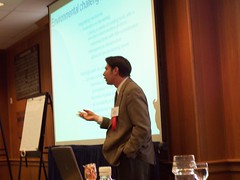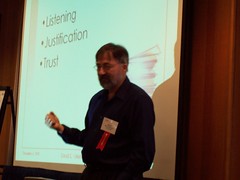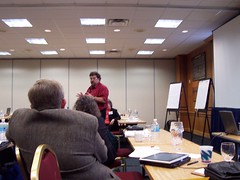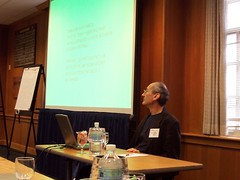Daser posts, Sunday 12/4/05
Please see original posts on http://asistdaser.tripod.com/daserblog/index.blog?from=20051204
Sunday, 4 December 2005
Feedback, evaluation, wrap-up Mood:  chatty
chatty Notes by Christina Pikas
Bob Kelly: APS focus groups
ML:
presentations up on the web page
list of participants out to the participants
evaluation of process and structure:
David - usually the best part of a conference is in the hallway, I feel like I've been in the hallway the whole time. This is a really good thing and it made it more interactive and a think tank... good people and the right people for the discussion.
Eating all of our meals together is a good thing. Have roundtable discussion topics at lunch
Good having a single track so we could see everything.
Presentations were easy to follow.
Suggestion -- Charleston model w/action items
Link to presentations. Also fewer speakers with more time to each speaker is better and more useful.
Wasn't well enough advertised.
Liked the tight focus.
Introductions are good.
Get a speaker who's not for open access (ML tried and was turned town)
She was expecting more technical presentations
Where are the blog notes available?
Get questions at meals, then have a program in the evening that addresses those questions.
Different seating arrangements.
Backchannel comms. Better wireless. Better power.
Affordable hotel.
David Stern, Yale: STM Libraries in the Future: Quo Vadis Mood:  quizzical
quizzical Purposeful abandonment
Notes by Christina Pikas

We live in a world of conflicts
we answer to faculty and administration
we love books, but don't buy a lot
mutually exclusive expectations
convenience vs. enhanced navigation
more options creates confusion
customization vs. personalization
administration
economies
industry
standards vs. branding
ease of use across platforms, consistency of icons/metaphors
environmental challenges
federation vs harvesting
package plan vs unbundling items
seamless pre-paid vs. transaction vs. tiered
IR - oa or archival
individual archives or consortial?
competing info resources
google/scholar easy vs. comprehensive
worldcat/sakai
-appropriate tools
-which inspec, holdings for pubmed
Incorporating multi-media
-teaching tools
-large datasets
KM
-personal/lab databases (lab results, local storage of group knowledge, links to published literature)
-data manipulation (not just pdf, repurposing of raw data, permissions)
Facilities
-create quiet rooms
-keyboard noises
-new group study spaces (just higher noise, technology, food/social)
-24x7
Self-archiving
IRs need to deal with unpublished, non-peer reviewed materials as well as peer-reviewed journal articles. (conf proceedings, white papers, technical reports)
searching these distributed archives is far from perfect
hybrid journals aren't well handled by link resolvers
(permissions are handled at the journal level, not at the article level)
strictly preservation archives
-lockss, dmca restrictions on sharing
-unnecessary redundancy/cost
-only saving pdfs (not data, not repurposable)
Portico (quality controls xml downloads from publishers, stores, metasearching, migration possibilities, runs on the JSTOR software)
daser2005Updated: 12/5 to add tag and picture
David L Osterbur: Drop Your Tools and Run Faster Mood:  caffeinated
caffeinated Notes by Christina Pikas

Weik 1996 Drop Your Tools: An Allegory for Organizational Studies. Administrative Science Quarterly 41(2):
Brown and Marek 2005 applied this in Library Admin and Mgmt 19(2): 68-74
Explanations for failure (to survive for firefighters in forest fire)
-listening (hearing, taking in, understanding that there's a different perspective)
-justification
-trust
-control
-skill at dropping
-admit failure (if you drop your tools you're admitting failure)
-social dynamics (following the crowd)
-consequences (proof that dropping tools will be a benefit)
-identity (how much is your identity tied up with those tools)
-replacement skill
Replacement skills
-bioinformatics support
big open access area, all of the data is available for free online... yet libraries aren't teaching these tools
-cheminformatics
who has control (luddites in control)
-adding value
Bioinformatics support
-we don't have to pay for, it's out there and used extensively
-no good service model for providing that support
-bioinformatics support groups don't have service mindsets -- they're researchers themselves and are interested in research, not in helping
-like
driving school vs. building the car
-librarians like to search (librarians have a rich source of things to show users that users don't know about)
-libraries need to regain role
Why don't libraries do it?
- "we have a support group" (help the support group, provide a service they don't offer, enough information for everyone)
-no one trained in it
NLM offers regional introductory course
http://www.ncbi.nlm.nih.gov/Class/MLACourse/index.html
advanced course yearly in Bethesda (5 day 9-5 course)
http://www.ncbi.nlm.nih.gov/Class/NAWBIS/index.html
13% of participants in the advanced course have humanities degrees.
-tricks of the trade... free full text textbooks other fab things that you can show in bioinformatics research
example: article re h5n1 increase virulence in mamals... sequence... blast... OR genbank, click on blink look up protein (never use keyword in genbank), gets to the point where he can show the differences between the 1918 pandemic flu virus and the avian flu currently of concern
can draw both sequences in 3d structure and see the differences (rotate, align, etc)
July in J MLA, article telling you how to do this and who is doing it... then just do it
Cheminformatics
ACS biggest provider (*cough* luddites)
Peter Murray-Rust
mass spec, machine readable vs. picture for pub or human understanding... also only give maxima
grad student takes 100 hours to take information away from what he has to
Chemical Markup Language (CML), XML markup... want to make searches for chemicals google-like... semantic grid for chemistry
Value Added
Notre Dame DSpace implementation services offered
Word about digital archives--
we won't be able to migrate fast enough (can't migrate all the data before it has to be migrated again)
Stuart Scheiber Microtome Publishing... ascii text
Conclusion
stay adaptable
from audience:
don't limit your constituency
daser2005Updated: 12/5 to add tag and picture
Michael Leach, Harvard: Whither the collections? Whither the librarian? Mood:  caffeinated
caffeinated Notes by Christina Pikas

Series of questions to the audience:
How many here work with S&T collections?
What % of collection development $ are serials?
What about the staff who had been employed to manage print collections?
To publishers, how do you want librarians to work with you?
Jan- free material needs to be cataloged, too. Role for librarians in financial setting - advocate open access to administrators who can pay for publication
Vivian- librarians discuss impact factor to administration, understand how the publishing industry works and work with publishers
Jan - q to librarians:
ARL used to derive status from the size of the budget -- librarians may not want the financial things taken away because it may impact status, is this an impact to you
a: yes... # of volumes (old school), budget collection vs. salary (ratio so that to lower collection budget but to hire librarians to manage free or less expensive eletronic resources would penalize you)
also to move money to other bugets to support authors publishing in oa from collection development budgets does take power away from the libraries -- we won't be selecting materials and providing access -- there will be universal access and all materials will be selected (maybe instruction)
BK: librarians have a key role in organizing information and new finding tools like folksonomies and other social software... especially with the proliferation of freely available information. Open access is a given. Tools to cross disciplines so physicists can see what biologists are saying... Librarians out of the stacks and into the world.
ML: he still sees a lot of his colleagues tied to their physical collections; but the e resources are so rich, so librarians need to be moving toward.
1) think beyond the traditional collections (even if e)
2) work closely with producers of materials (faculty, post-docs, etc), become a support mechanism for these researchers. Help them submit to journals. Help them submit to archives (oa, ir, etc).
3) teaching and advocating. more than information literacy... scholarly communication at all levels
4) google is a good thing. spend less money on OPACs and spend the money elsewhere
5) libraries as a whole do not put enough money into R&D: user needs analysis, develping user interfaces, marketing... this is left to third parties like vendors. (exception Rochester, has a staff anthropologist?!?) we are too passive, meek
audience:
BC: instruction... historically first course in cheminformatics included using the chemical literature but methods of presentation, ethics, intellectual property, knowledge of the prizes/awards... developing information fluency ...
"pardon me, is my eye hurting the end of your umbrella"
PW: library is not based on the physical space, we need to do value-added service, contextual support could be added to the repository... how about forming the citation for me?
T (from SPIRES): a lot of this is already going on, libraries have a tradition, being physically co-located with the library as a programmer is very important
P L-S: our library has already lost complete control of the budget. they are already there becase that's all they do, they don't manage collections
daser2005Updated: 12/5 to add tag and picture
Tim Hays, NIH: NIH Public Access Policy Mood:  caffeinated
caffeinated Notes by Christina Pikas

Announced in Feb, implemented in May. In PubMed Central
Goals
- archive of NIH research
- advance science
- access to the public
Driving Forces included Congress, new IT, increasing public use of the internet
56% of internet users bring documents with them when they visit the doctor's office (?!?)
Internal drivers: need archive to study the outcomes of funding efforts, make information available that they paid for on the public's behalf
The policy:
-0-12 month embargo
-peer-reviewed, original research publications, supported in whole or in with direct costs from NIH. Not book chapters, editorials, review, or conference proceedings.
-currently funded (or if accepted for publication after May..)
-does not affect copyright
-authors are encouraged to add a line to their publication agreement that says that they will submit to NIH
-should not effect peer review
-should not affect scientific publishing (1% journals in pubmed have more than 50% of their articles funded by NIH, 10% of the articles in pubmed were funded by NIH)
-has had some positive effect with journals now having a self-archiving policy
(audience comment that Nature is backsliding from 0 month self-archiving to 6 month self-archiving)
Timeline
Final policy 2/3/2005
System released 5/05
New website 10/05
by Feb/06 hope to have a batch upload function (they're working with Elsevier, Wiley, Nature)
Participation
About 2% to 3% (not including the 8% from PubMedCentral journals that are in there by default) as SH said this 10% mirrors the participation world-wide in self-archiving with no policy (or TLC from a librarian :) )
Delay/embargo
- about 60% immediate pub, 20% after 9-12 months
- Have removed 40 articles because of too early publication (from about 10 journals)
Issues with researchers who want/need to get published, but worry that the copyright negotiations may delay or prevent paper acceptance, plus figuring out funder policy, their institution policy...
NIH is doing outreach
Public Policy Working Group (11/15/2005)
Limited survey of 19 health sciences libraries... 87% of faculty were aware of the policy, 4% had submitted
Largest factors
-time
-priority
-confusion over copyright and version
Q from audience:
-make mandatory (this is being considered, but somewhat difficult because part of the regulatory process, also Dr. Zerhouni saw this as a way of changing the landscape -- did not want to cause bad will with groups with whom NIH cooperates)
-group doesn't include open access publishers
Working with publishers
-3rd party submissions
-Elsevier, Nature, Wiley submit directly (they control version, embargo)
-software tool for offline verification of grant numbers
-will post the publisher version over the author version, place links to the publisher site, correct author errors, place links to article correction notificationon the publishers web site
-will have xml and pdfs of all documents
Questions to the working group
1) should participation be mandatory - 12 out of 14 yes (two who said no, Elsevier (no, really?) and FASEB)
2) what should be the embargo?
A variety, many said 6months
3) what is the best version
publisher version, but not clear on whether xml or pdf
Next steps
-continue outreach
-evaluate
-batch uploading
-report to congress
From the audience:
sh: "flawed policy that missed historic opportunity... but can be improved" flaws: voluntary, let the word embargo be said, demand central deposit
should have done: request that the depost be made either in own IR or in PMC, then PMC can harvest automatically from IRs. make it into an instant deposit upon acceptance. build into metadata that shows up immediately - with e-mail to author to request e-print. NIH should also offer to pay reasonable publishing in open access
From Jan V: springer is not on committee, but should be mandatory, no embargo, both xml and pdf, explicitly say on the NIH page that it is OK for open access publishing to be covered by grants (Wellcome trust does this).
From Brad: mandatory is the important thing
From Mary: mandatory needs to happen that will really be transformative
From Paige: impact to publishers... what would it be if all of the large science funders in government (DOD, NASA, ... ) did this
From Peiling: theoretically mandatory is necessary, but getting the regulations in place is a long term thing... what if all new grants from this point forward have that requirement?
Vivian: meeting of publishers hosted by Blackwell where everyone got up and said how horrible this is... unnecessary duplication of what highwire pubs etc are doing...
Is there an analysis that shows if people can get to things that they would not have been able to get to otherwise... IOW, does it really make things available that aren't elsewhere available?
Answer: not enough content, plan to evaluate....
daser2005Updated: 12/5 to add tag and picture
Stevan Harnad, Southampton, U Q at Montreal: (no title) Mood:  on fire
on fire Notes by Christina Pikas

Data and slides available online and may be reused. There were slight technical difficulties.
Why do researchers publish?
Not for money but to communicate results
Open access is:
free, immediate, permanent, and full text online access
primarily peer reviewed journal articles, theses
Why?
Lawrence 2001, more citations to online articles than offline articles in the same venue (not open access effect)
To what extent were Lawrence's results only a CS effect? The compared OA vs. Non-OA in Astro
(he states that there are basically 12 astro journals, all astronomers are at institutions that cover these 12 at minimum, so to them there is open access) and other physics, sociology and biology.
http://opcit.eprints.org/oacitation-biblio.html
Lots of fast moving graphs here, based on a robot that gathered 1.4 million self-archived articles across about 10 fields (not phys, but does include some social sciences). Grouped articles by # of citations (in bins), then graphed for each bin, #articles for each pub year. Did the same for non-open access articles. Then took the ratio of one to the other, found (I believe and I think he'll correct me) that in general, open access articles are more highly cited across disciplines than non-open access articles.
Dollar value value of citation (a la Diamond 1986 and adjusted to current year money), $85/citation... The UK is losing 300k potential citations and 1.5B GBP based on the above calculations.
Research assessment, research funding, citation impact
All of the factors that are used to evaluate researchers and research groups.... correlate highly with citation counts. Citation counts would better highlight a really good article in a lesser journal.
Changing Citation Behavior
Peak of the curve is moving earlier and earlier. Citations may occur within 3 weeks of self-archiving (!) These charts come from
citebase. Self-archiving has speeded up citation behavior, immediacy, and the movement of physics.
Open access - how?
Archives without an institutional self-archiving policy remain nearly empty.
What prevents us from open access in the form of self-archiving is keystrokes, not copyright
Awareness of author compliance (study?)
81% would willingly comply with self-archiving policy. 5 archives that have mandates are some of the largest (so this works) ... examples CERN, Southamption. University of Tasmania vs. Queensland productivity (?) +archives +librarian assistance +mandate ... (See upcoming D-lib article by Arthur Sale?)
388 institutional archives worldwide (they've found), vast majority are empty. In Germany every institution has an IR, but no policy (and sometimes no tender loving care)
Audience questions
a: Have the successful archives in the above mentioned Australian universities experienced citation effects?
a: early yet, but some
q: Infoglut or version control-
Will there be problems with too many versions... or access to the correct version
a: no, researchers just want the materials. researchers know what they're doing, what's a post-print, what's a pre-print, and what's good literature -- this is not done by librarians but is part of being a professional researcher
Robot -- didn't specify that articles were true OA, just that they were available online fulltext for free at the time of the crawl. Future work may try to address this
Q: about the wording of self-archiving... SH says that it's a supplement to subscription access.
Q: citation life cycle -- doesn't that bias this because articles might be self-archived only after they have proven to be good articles (I may have gotten this wrong sorry D.S.)
SH: they are studying latency, life cycle, immediacy
daser2005Updated: 12/5 to add tag and picture, correctly spell the speakers first name.
Posted by asistdaser at 9:56 AM EST |
post your comment (0) |
link to this post









